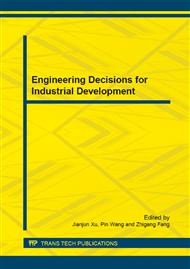p.140
p.144
p.148
p.152
p.156
p.161
p.165
p.169
p.174
A New Parameterization Method for Large-Scale Reservoir History
Abstract:
A novel and simple parameterization method using an ensemble of unconditional model realizations is applied to decrease the dimension of the misfit objective function in large-scale history matching problems. The major advantage of this parameterization method is that the singular value decomposition (SVD) calculation is completely avoided, which saves time and cost for huge matrix decomposition and the eigenvectors computations in parameterization process. After objective function transforms from a higher dimension to a lower dimension by parameterization, a Monte Carlo approach is introduced to evaluate the gradient information in the lower domain. Unlike the adjoint-gradient algorithms, the gradient in our method is estimated by Monte Carlo stochastic method, which can be easily coupled with different numerical simulator and avoid complicated adjoint code. When the estimated gradient information is obtained, any gradient-based algorithm can be implemented for optimizing the objective function. The Monte Carlo algorithm combined with the parameterization method is applied to Brugge reservoir field. The result shows that our present method gives a good estimation of reservoir properties and decreases the geological uncertainty without SVD but with a lower final objective function value, which provides a more efficient and useful way for history matching in large scale field.
Info:
Periodical:
Pages:
156-160
DOI:
Citation:
Online since:
February 2015
Price:
Сopyright:
© 2015 Trans Tech Publications Ltd. All Rights Reserved
Share:
Citation:


